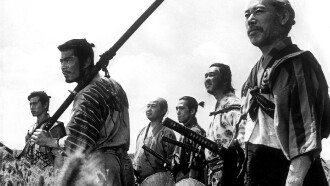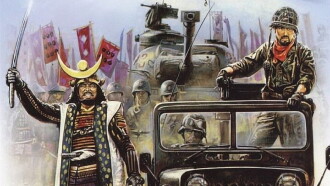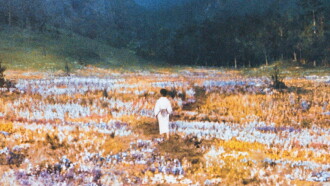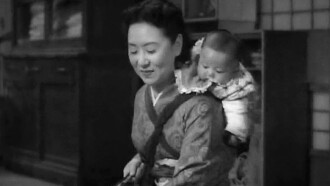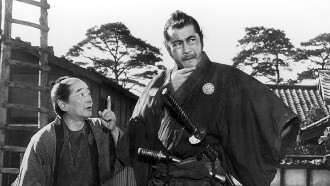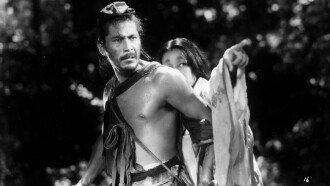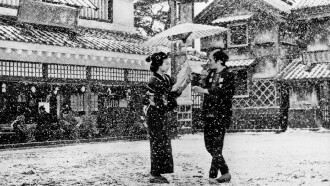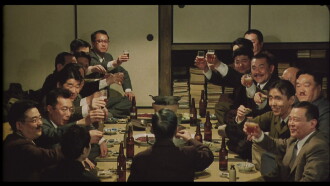Noriko Honma Trailers
Madadayo TrailerRhapsody in August TrailerDreams Trailer
Noriko Honma (本間文子 Honma Noriko, born 29 November 1911 - 12 April 2009) is a Japanese actress whose film work occurred primarily during the 1950s. She was born in Hokkaido. She worked in many of Akira Kurosawa's films, first appearing in Kurosawa's Rashomon as the Miko, also in Ikiru, The Seven Samurai, Akahige, and Dreams.
Most Popular Noriko Honma Trailers
Total trailers found: 52
17 December 1957
Ushinosuke returns to his hometown to become a farmer.
Part three (of four) of the film adaptation of Bunroku Shishi’s novel, Oban.
26 April 1954
A samurai answers a village's request for protection after he falls on hard times. The town needs protection from bandits, so the samurai gathers six others to help him teach the people how to defend themselves, and the villagers provide the soldiers with food.
25 May 1991
The story centers on an elderly hibakusha, whose husband was one of 80,000 human beings killed in the 1945 atomic bombing of Nagasaki, caring for her four grandchildren over the summer.
17 September 1979
A squadron of Japanese Self-Defense Force soldiers find themselves transported through time to their country's warring states era, when rival samurai clans were battling to become the supreme Shogun.
09 October 1952
Kanji Watanabe is a middle-aged man who has worked in the same monotonous bureaucratic position for decades.
11 May 1990
A collection of magical tales based upon the actual dreams of director Akira Kurosawa.
19 August 1953
The eldest daughter of a rural family Mon returns home from Tokyo pregnant after an affair with a college student Kobata, which causes a scandal that will threaten the marriage prospects of the younger sister San, in her cash-strapped family.
12 June 1952
A teenaged girl witnesses her widowed mother's attempt to sustain her family.
25 April 1961
A nameless ronin, or samurai with no master, enters a small village in feudal Japan where two rival businessmen are struggling for control of the local gambling trade.
26 August 1950
Brimming with action while incisively examining the nature of truth, "Rashomon" is perhaps the finest film ever to investigate the philosophy of justice.
01 August 1969
Japan and Russia clash in what comes to be known as the Russo-Japanese War. An attempt by the Japanese fleet and army to take Port Arthur fails, and a Russian fleet bears down on the Sea of Japan.
05 March 1953
Where Chimneys Are Seen focuses primarily on the interconnected lives of two couples in a lower-middle-class neighborhood in Senju, a poor industrial section of Tokyo.
17 October 1949
A bad day gets worse for young detective Murakami when a pickpocket steals his gun on a hot, crowded bus.
02 September 1958
A war widow with a young boy manages a farm with her bossy mother-in-law. When a reporter comes to interview her, the two begin an affair.
21 August 1938
Based on an autobiographical story by Toyota Masako.
03 April 1965
Aspiring to an easy job as personal physician to a wealthy family, Noboru Yasumoto is disappointed when his first post after medical school takes him to a small country clinic under the gruff doctor Red Beard.
11 March 1939
Father of nine children cannot find a job. Despite their aspirations, the children are encouraged by both parents to hold down menial jobs and contribute to the family expenses.
26 May 1958
Ultra-perky model likes single freedom but feels ryosai kenbo ("good wife, wise mother") pressure, exemplified by her bored-to-tears sister.
27 May 1962
1962 Japanese movie
18 April 1964
During the mayoral election, two ex-prisoners decide to replace the lucky pen of an annoying candidate with a mini-bomb.
27 July 1954
Postwar Tokyo. Pin and Toku live in the squatter area of Kappanuma. Pin and Toku are avid gamblers. They take in Tsuru, a slightly demented woman who has run away from a geisha house.
28 May 1957
A woman marries, gives birth to a stillborn child, and divorces, falls in love with a hotel-keeper, only to find herself subordinated to his drive for success, takes up with a tailor who cannot console himself with her strong personality.
17 December 1966
Searching for his brother, Ryota stows away on a boat belonging to a criminal alongside two other teenagers.
15 January 1959
Ryuta and Mineo Komatsu are brothers, both yakuza (gangsters). Mineo, although complicit in crime, even murder, wants out of the gangster life, hoping to become a successful singer instead.
31 August 1955
Forced on the road by yakuza obligations, a man sets out on a reckless journey to Tsumagoi. Movie posters for local cinemas were often displayed at sento (public baths) too.
03 August 1951
The Blue Pearl depicts the interplay between a young man from Tokyo and two ama (pearl divers; literally “women of the sea”) in a superstitious coastal town.
17 April 1993
Based on the life of Hyakken Uchida, a Japanese author and academic. The film opens with Uchida resigning his job as a German professor at the onset of WWII.
28 October 1967
In the 19th century Edo period, sisters Oshizu and Otaka have sacrificed their personal happiness to work and care for their ailing father.
09 July 1957
An Ishiro Honda film. The first part of A Rainbow Plays in My Heart released the same day as the second film.
14 August 1960
A skilled country doctor's talents are such that he can even perform operations as difficult and novel as removing a patient's kidney for the first time in Japan.
14 October 1958
When a rare species of butterfly is found in a mysterious valley in Japan, a pair of entomologists go to investigate and find more.
08 December 1962
1962 Japanese movie
29 April 1953
Ten years into a marriage, the wife is disappointed by the husband's lack of financial success, meaning she has to work and can't treat herself and the husband finds the wife slovenly and mean-spirited: she neither cooks not cleans particularly well and is generally disagreeable.
03 January 1956
A humble and simple Takezo abandons his life as a knight errant. He's sought as a teacher and vassal by Shogun, Japan's most powerful clan leader.
03 May 1956
Kiyoko (Takamine Hideko) and her husband want to open a coffee shop. She becomes increasingly close to the bank clerk (Mifune Toshiro) she's asked for a loan.
15 January 1960
Keiko, whom everyone calls Mama, narrates her story: she's a hostess on the Ginza, 30, a widow. She describes life's vicious cycle: acting cheerful around drunks, dressing and living well to convey confidence, needing money for these expenses and for her demanding mother and brother, and knowing she's growing older.
22 November 1955
Kiichi Nakajima, an elderly foundry owner, is convinced that Japan will be affected by an imminent nuclear war, and resolves to move his family to safety in Brazil.
07 December 1962
In an effort to find an economic means of purifying salt water, a joint U.S.-Japanese military command is set up on an isolated Japanese island where an unusual salt water lake is situated.
15 September 1953
Girls in the Orchard (1953) is about tension between the life of a family in a rural area with all the traditions (continuing family business, taking care of the land)-- and the modernity and lure of a life in the city.
09 July 1957
An Ishiro Honda film. The second part of A Rainbow Plays in My Heart released the same day as the first film.
08 June 1954
A legendary gangster raises himself out of a small town and gathers followers on his rise to power.
22 January 1953
A married couple looking for an apartment move in with the husband's co-worker, a widower. The husband becomes jealous of the widower and his wife.
26 February 1950
An attempt is made to suppress a journalist's investigation of collusion between a rural police chief and the local gangster bosses.
08 September 1959
A modern love story involving different affairs.
15 May 1952
Soichi Ataka is the eldest son of Ataka family. Although mentally challenged, he's a person with a gentle heart.
13 January 1951
Japanese "kayo" film based on the song "Ieraishan" by Yoshiko Yamaguchi.
13 September 1955
The story of a couple, a spoiled son and a down-to-earth girl, in Osaka in the early Showa era. The film won the prestigious Blue Ribbon awards for best director, best actor (Morishige) and best actress (Awashima), and the Mainichi Concours award for best actor and best screenplay (Yasumi Toshio).
20 October 1954
Lonely youth Shinji meets Hatsue, a pretty pearl diver, on the beach and the two fall in love. But Shinji has a rival for Hatsue's affections, Yasuo.
01 July 1953
A story of unhappy youths and the perils of lack of sex education.




